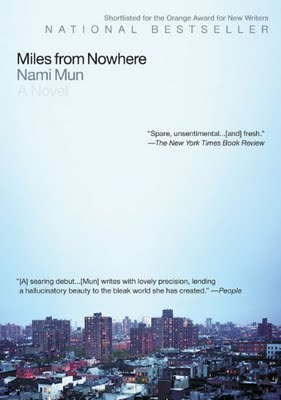 I am so addicted to bookstores. I love to leisurely browse the shelves and see what speaks to me.
I am so addicted to bookstores. I love to leisurely browse the shelves and see what speaks to me.On a recent trip to a major book retailer, Christmas giftcard in hand, I did just that and came away with "Miles From Nowhere" by Nami Mun, Riverhead Books, 2009, 286 pages, $14.00 (paperback).
I opened the book an read the first paragraph, which begins: "I'd been at the shelter for two weeks and there was nothing to do but go to counseling or lie on my cot and count the rows of empty cots nailed to the floor or watch TV in the rec room, where the girls cornrowed each other's hair and went on about pulling a date with Reggie the counselor because he looked like Billy Dee Williams and had a rump-roast ass. I didn't see a way to join in, but I didn't feel like being alone, either."
I was intrigued and wanted to stay with this lonely narrator, 13-year-old Joon, and find out where she was going from that point.
Cursed by parents obsessed with their own dramas who don't care if she lives or dies, Joon takes to the streets and survives - sometimes barely - on her own wits. We go along for the ride with her as she spirals into addiction, is beaten, used, taken advantage of in so many ways. But she survives, and on the streets that is success of a sort.
It's the way the story is written that is captivating. It's spare and wise, unemotional and blunt, bold and painful. The tone doesn't apologize, it simply reveals.
During the course of the novel, which is set in 1980s New York City, the young Korean girl finds work as a dancer/hostess, newspaper hawker, drug dealer, makeshift hooker, Avon lady in the ghetto, nursing home activities assistant, and as a delivery girl for a sandwich joint. She quickly - very quickly - becomes addicted to heroin and will gladly try any drink or drug she can get her hands on, just to escape for a moment the brutality of the life she's chosen.
Joon knows the street life is no good for her, but she can't find a way to climb out of it (when she does, someone is always there to show her the way back down). She's often homeless, sleeping on a ferry some nights, the subway on others.
"At night I used to ride the ferry back and forth, from the city to Staten Island. I'd watch the diamond lights smearing the wet window glass or stand out on the windy deck as the regulars sat crooked, drinking their pints and shouting about different kinds of loss."
At one point, she's sharing an apartment with 20 people taking turns on the one mattress. If it's not your "night," you're on the floor or in the bathtub. But if you do favors for the person who has the mattress for the night, well, then, you may just get so sleep a few inches off the flor.
The apartness Joon feels from her own situation, from the street life, is apparent and compelling. She does make friends along the way: Knowledge, her protector from the shelter; Benny, the bad-news boyfriend who keeps her on the needle; Tati, her crazy asian drinking buddy.
It turns out the novel is somewhat autobiographical. Like Joon, Mun is Korean, grew up in the Bronx, and, according to the book jacket, has in her lifetime worked as an Avon lady and activities coordinator for a nursing home.
This is her debut novel. A bestseller, it was shortlisted for the Orange Award for New Writers.
It's no-holds-barred glimpse into the netherworld of every American city. We are invited into Joon's bleak world and are treated to beautiful descriptive passages at times when it seems all hope is lost.
I was rooting for Joon to not only survive, but find her place in the world. A worthwhile read, if bleak and brutally honest. The glimpses of hope and beauty are enough to sustain you through this short, readable novel.
No comments:
Post a Comment